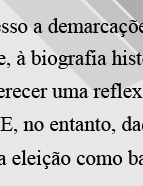

................................
While obviously not impervious to the major analytical wave, the fate of biography does not appear to have been quite as French in Portugal. It is a fact that some echo of the debate around biographical writing reached the academic milieu, as part of a broader discussion on methodological and epistemological issues raised primarily by the French Annales movement. However, it is difficult to recognise in this discussion in Portugal – apart from the exclusive adoption by some of the anti-individualistic theoretical models – a radicalisation of terms that would foreshadow the almost total marginalisation of the genre that is talked about so much more today than back then. In his work dedicated to the economic situation during the time of the Marquis of Pombal, for example, J. Borges de Macedo postulated as a principle that no personal trajectory could serve as a matrix for, or replace, a "global explanation." However, rather than renouncing the genre altogether (he would even take part in Os grandes portugueses, by H. Cidade, a few years later), the author pointed to a specific model of biography, an ideal model, as Herculano had also defended many decades earlier – that of the great man, in which the entire history of a period or a "people" is synthesised. In fact, Macedo's assertion echoed a concern that had affected some authors in the mid-19th century who had dedicated themselves to historical portraiture or, more specifically, thought about the relationship between the individual and context. While not new and having faced decades-long dominance, especially practical, of the most extreme voluntarist theories – those that in an authoritarian environment pitted individual will against the irrationality of the masses – this issue gained new vigour in the mid-century. Within the academic sphere, but no longer limited by the girdle of purely methodical practice, scholars began to rethink the place of biography in historical interpretation (J.B. Macedo, 1951, pp.27-31; A. Herculano, “Cartas sobre a História de Portugal. Carta IV”, [1842]).
The fact that academics with a Marxist background may be identified among some practitioners of the genre is not a unique phenomenon. On the one hand, the biographical exercise paved the way for a discussion on the relative positions of the individual and the collective which served the underlying ideological debate, consistent with positivist theories. By adopting what he referred to as the "sociologist method," Vítor de Sá, for example, could "counterpose" the "Antero-Antero," studied on the basis of himself, to the "Antero-product-of-a-context," a contingent point of intersection of major social processes.
